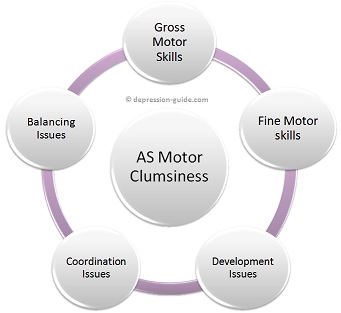Motor Clumsiness and Asperger syndrome (AS)
TweetSometimes, the Asperger Syndrome kids suffer from delayed motor development. They do not have ability to move their body physically with ease and with coordinated grace. Although the motor clumsiness is not the required symptom for the diagnosis of Asperger Syndrome, lack of proper motor skills is generally assiciated with Aspergers.
Many kids with AS have some or the other history from the motor skills side like they gave difficulty in riding a bike, cannot open the jars and they cannot play catch a ball. They have a slight or prominent swagger in their normal walking style as well. There is a need to define the lack of motor skills in developmental terms and should not be tagged as a symtoms of all the AS patients. Many AS patients oversome this lack of motor clumsiness as they grow up.
Still, not all who are suffering from Asperger's syndrome has poor fine motor skills or gross motor skills. It is common, but not a mandatory symptom of AS.
Musculur Clumsiness Symptoms in Aspergers Syndrome
AS kids never show excellence in sports or activities which involves general gross motor skills. There are instances of AS kids having mastery in musical instruments, but the sports is very different. They have difficulty in performing action which need them to make balance and create coordination among different things. These kids have difficulty in writing because they cannot hold the pencil properly and take time to learn the same, as compared to non-AS kids of their age.
The AS kids are also affected by muscular weakness which can impact their way of sitting, standing, strength, etc. Many of these kids refrain from instances where they need to touch, or hug someone. There is a high need of occupational and physical therapies in these kids in the early stages of diagnosis.
The AS kids also suffer from fine motor skills which leads to poor performance in schools. The lack of writing skills is the reason behind the same.

Motor skills related problems in AS kids
- They show clumsiness in almost all the activities they perform
- They cannot maintain and make balance
- The kids appear very stiff and rigid
- Since they are always strained, they get tired very quickly.
- They cannot ask their body to do what they want and most of time, there is a appar ant lag in the actions and words.
Treatment for the clumsiness in AS
There are occupational therapy and other physical therapies available for children who lack fine motor skills and gross motor skills. The sensory integration issues can be tackled by providing proper therapy. The motor and sensory impairments in the AS patients do not fade or diminish by ageing. They are still there and need therapy for handling and managing them.


Sometimes crying or laughing
are the only options left,
and laughing feels better right now.

Current Issue
 Self Help Leaflets Take the help of our self help leaflets or booklets. |
 The DG Magazine All about living with depression |
Asperger's Syndrome
- About Aspergers Syndrome
- Adult Asperger Syndrome
- Asperger Characteristics
- Asperger Syndrome Behavior
- Asperger Syndrome Cause
- Asperger Syndrome Describing Disorder to Parent
- Asperger Syndrome Details
- Asperger Syndrome Medication
- Asperger Syndrome Therapies
- Aspergers Attention Problems
- Aspergers and Classroom Accomodations
- Aspergers and Middle School
- Books on Children with Asperger Syndrome
- Coping Method for Teens with Asperger Syndrome
- Gym Class and Asperger
- Is Asperger Syndrome a Learning Disability
- Martial Arts Therapy for Aspergers
- Mixed State Bipolar Aspergers
- Online Test Asperger Syndrome
- Non-Verbal Learning Disorder
- Students with Asperger Syndrome
- High Functioning Autism and Asperger Syndrome
- Catatonia and Asperger Syndome
- Motor Clumsiness
- Hans Asperger
- Parenting a child with Autism
- Treatment
- History
- Diagnosis












